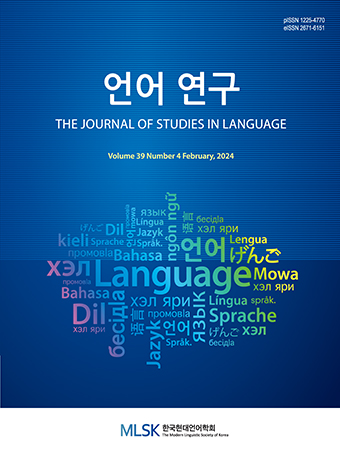Research Article
Abstract
References
Information
Biscuit conditionals are peculiar in that the truth value of the consequent is always true, unlike indicative conditionals where the consequent’s truth value is contingent on the truth value of the antecedent. In Choi and Joh (2016), it is claimed that the peculiarity of the biscuit conditionals can be mitigated when the antecedent is interpreted as a question and the consequent as an answer through speech act metonymy. The metonymic analysis is based on the Question scenario that Panther and Thornburg (1999) suggest. However, some biscuit conditionals with an imperative and a question in their consequent clauses seem resistant to the analysis. In the paper, it is claimed that they are similarly explained if the Request or the Emotion scenario is applied on top of the Question scenario.
- Bach, K. 1999. The Myth of Conventional Implicature. Linguistics and Philosophy 22, 327-366. 10.1023/A:1005466020243
- Bach, K. and R. Harnish. 1979. Linguistic Communication and Speech Acts. Cambridge: MIT Press.
- Boër, S. and W. Lycan. 1980. A Performadox in Truth Conditional Semantics. Linguistics and Philosophy 4, 71-100. 10.1007/BF00351814
- Choi, Y. 2013. The Potentiality for Actuality Metonymy in English and Korean. English21 26.4, 407-429. 10.35771/engdoi.2013.26.4.020
- Choi, Y. and Y.-K. Joh. 2016. Speech Act Metonymy in Biscuit Conditionals. The Linguistic Association of Korea Journal 24.4, 1-22. 10.24303/lakdoi.2016.24.4.81
- Comrie, B. 1986. Conditionals: A Typology. In E. Traugott, A. ter Meulen, J. Snitzer Reilly, and C. A. Ferguson (eds.), On Conditionals. Cambridge: Cambridge University Press, 77-99. 10.1017/CBO9780511753466.005
- DeRose, K. and R. Grandy. 1999. Conditional Assertions and Biscuit Conditionals, Noûs 33, 405-420. 10.1111/0029-4624.00161
- Dummet, M. 1973. Frege: Philosophy of Language. London: Duckworsth.
- Ebert, C., C. Endriss, and S. Hinterwimmer. 2008. A Unified Analysis of Indicative and Biscuit Conditionals as Topics. In Proceedings of SALT XVIII. 266-283. 10.3765/salt.v18i0.2473
- Grice, H. P. 1967. Logic and Conversation. In P. Cole, and J. L. Morgan (eds.), Syntax and Semantics Vol. 3: Speech Acts. New York: Academic Press, 41-58. 10.1163/9789004368811_003
- Horn, R. 1989. A Natural History of Negation. Stanford: CSLI Publications.
- Iatridou, S. 1991. Topics in Conditionals. Unpublished doctoral dissertation. MIT. Boston, MA.
- Joh, Y.-K. 2011. Biscuit Conditionals as Disguised Conversations. KASELL 11.1, 243-268. 10.15738/kjell.11.1.201103.243
- Kövecses, Z. and G. Radden. 1998. Metonymy: Developing a Cognitive Linguistic View. Cognitive Linguistics 9.1, 37-77. 10.1515/cogl.1998.9.1.37
- Lakoff, G. 1972. Linguistics and Natural Logic. In D. Davidson, and G. Harmon (eds.), Semantics of Natural Language. Dordrecht: Reidel, 545-665. 10.1007/978-94-010-2557-7_19
- McCready, E. 2004. Two Japanese Adverbials and Expressive Content. A talk given at the Semantics and Linguistic Theory SALT conference 14, Northwestern University, Evanston, IL, May 14-16. 10.3765/salt.v14i0.2910
- Panther, K.-U. and L. L. Thornburg. 1998. A Cognitive Approach to Inferencing in Conversation. Journal of Pragmatics 30.6, 755-769. 10.1016/S0378-2166(98)00028-9
- Panther, K.-U. and L. L. Thornburg. 1999. The Potentiality for Actuality Metonymy in English and Hungarian. In K.-U. Panther, and G. Radden (eds.), Metonymy in Language and Thought. Amsterdam: John Benjamins, 333-357. 10.1075/hcp.4.19pan
- Panther, K.-U. and L. L. Thornburg. 2005. Motivation and convention in some speech act constructions: A cognitive- linguistic approach. In S. Marmaridou, K. Nikiforidou, and E. Antonopoulou (Eds.), Reviewing linguistic thought: Converging trends for the 21st century pp. 53-76. Berlin and New York: Mouton der Gruyter.
- Panther, K.-U. and L. L. Thornburg. 2007. Metonymy. In D. Geeraerts, and H. Cuyckens (eds.), The Oxford Handbook of Cognitive Linguistics. Oxford: Oxford University Press, 236-263.
- Peirsman, Y. and D. Geeraerts. 2006. Metonymy as a Prototypical Category. Cognitive Linguistics 17.3, 269-316. 10.1515/COG.2006.007
- Portner, P. 2004. The semantics of imperatives: Within a theory of clause types. A talk given at the Semantics and Linguistic Theory SALT Conference 14, Northwestern University, Evanston, IL, May 14-16. 10.3765/salt.v14i0.2907
- Radden, G. and Z. Kövecses. 1999. Towards a Theory of Metonymy. In K.-U. Panther, and G. Radden (eds.), Metonymy in Language and Thought. Amsterdam: John Benjamins, 17-59. 10.1075/hcp.4.03rad
- Ross, J. R. (1970). On Declarative Sentences. In R. A. Jacobs and P. S. Rosenbaum (eds.), Readings in English Transformational Grammar. Ginn: Waltham, Mass, 222-277.
- Sadock, J. 1974. Towards a Linguistic Theory of Speech Acts. New York: Academic Press.
- Siegel, M. 2006. Biscuit Conditionals: Quantification over Potential Literal Acts. Linguistics and Philosophy 29, 167-203. 10.1007/s10988-006-0003-2
- Thornburg, L. and K.-U. Panther. 1997. Speech Act Metonymies. In W.A. Liebert et al. (eds.), Discourse and Perspectives in Cognitive Linguistics. Amsterdam: John Benjamins, 205-219. 10.1075/cilt.151.14tho
- Van der Auwera, J. 1986. Conditionals and Speech Acts. In E. C. Trauggot, A. ter Meulen, J. S. Reilly, and C. A. Ferguson (eds.), On Conditionals. Cambridge: Cambridge University Press, 197-214. 10.1017/CBO9780511753466.011
- Publisher :The Modern Linguistic Society of Korea
- Publisher(Ko) :한국현대언어학회
- Journal Title :The Journal of Studies in Language
- Journal Title(Ko) :언어연구
- Volume : 36
- No :2
- Pages :211-225
- DOI :https://doi.org/10.18627/jslg.36.2.202008.211




 The Journal of Studies in Language
The Journal of Studies in Language






